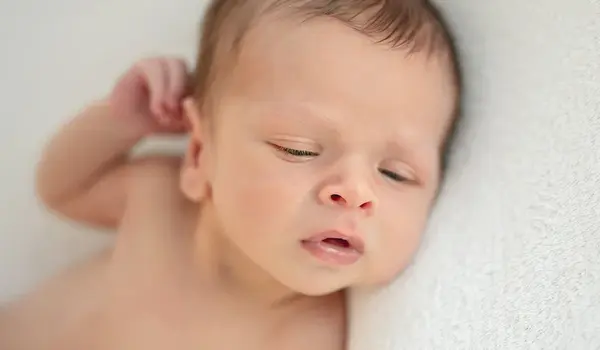Sleep
Sleeping Babies With Open Eyes: Top 3 Reasons

Sleeping Babies Eyes Open: What Parents Need to Know
Watching your baby sleep is calming, but open eyes during sleep can be startling. Sleeping Babies Eyes Open might surprise you. Some babies sleep with partially or fully open eyes, a condition called nocturnal lagophthalmos. While it may look strange, it’s often harmless and temporary. Still, understanding the causes helps parents sleep easier too.
Is It Normal for Babies to Sleep with Open Eyes?
Many parents notice their baby dozing with open eyes and feel confused. However, this sight is typically not alarming. In most cases, sleeping with open eyes is a natural part of infant development. The medical term for this behavior is nocturnal lagophthalmos. It usually resolves as your child grows older.
This condition does not indicate any medical disorder. In rare instances, it may signal an underlying issue. Therefore, observing closely and knowing what to watch out for is important.
Why Do Babies Sleep with Their Eyes Open?
Several factors might explain Sleeping Babies Eyes Open. Although mostly harmless, knowing the reasons gives peace of mind.
1. Genetics Could Play a Role
If a close family member experiences open-eye sleeping, your baby might inherit the same tendency. Genetics often influence this condition.
A mom named Andrea shared her story online. Her son Rafael sleeps with his eyes open during deep sleep and sometimes wakes up startled. Interestingly, Andrea’s brother had the same habit as a baby and still does as an adult.
2. It’s Linked to REM Sleep
Babies spend much of their time in REM sleep, which features vivid dreams and eye movements. During REM, your baby’s eyelids might not fully close. Because their nervous systems are still developing, this reaction is completely normal and part of growth.
3. Congenital Facial Nerve Conditions
In rare cases, Sleeping Babies Eyes Open might relate to congenital nerve conditions. If facial nerve development is incomplete, eyelids may not close during rest. However, most babies do not fall into this category. Your pediatrician can help determine the cause if you are concerned.
When Should You Call a Pediatrician?
If the condition persists beyond a few months, consult your pediatrician. This is especially important if you notice eye redness, dryness, or swelling. These symptoms could signal irritation or the need for treatment.
In extremely rare cases, eyelid muscle problems or nerve disorders require medical intervention. Always trust your instincts as a parent. If something feels unusual, reach out to a doctor promptly.
Does It Affect Sleep Quality?
Some parents ask whether open-eye sleeping affects a baby’s rest. Research shows that visual stimuli can interrupt sleep if the eyes remain open. Light or movement may disturb rest and lower sleep quality. This is why some babies wake frequently when exposed to light sources.
Talk to your pediatrician if you feel your child’s sleep is not restful. Solutions such as eye-safe ointments or blackout curtains may help.
Frequently Asked Questions
1. Why Do Babies Twitch Their Eyes During Sleep?
Eye twitching during sleep is normal. It often happens during REM stages when the baby’s brain remains highly active. This stage stimulates facial and body muscle movement, causing eye twitches, limb jerks, or small facial expressions.
2. Why Do Babies Roll Eyes or Smile While Sleeping?
Rolling eyes or smiling during sleep is also tied to REM sleep. These movements are part of your baby’s developing brain activity. Since babies can’t control these reactions, there’s no need for alarm. It usually signals healthy brain development.
3. Should I Be Concerned About Sleep Quality?
Although many infants sleep soundly, open eyes may allow light to disrupt deep rest. That’s why Sleeping Babies Eyes Open may result in poor sleep for some babies. You can improve sleep by dimming lights, using eye-friendly balms, or talking to your pediatrician.
Final Thoughts on Sleeping Babies Eyes Open
Sleeping Babies Eyes Open may seem unusual but is usually harmless. Most babies outgrow this habit as their muscles mature. Always monitor for any additional symptoms like dry or red eyes. If you notice anything unusual, consult your pediatrician for reassurance.
Understanding this condition helps you provide the best sleep environment for your baby. Every baby sleeps differently, and what’s normal for one may not be for another.

Courtesy of Mom Junction
Explore more expert parenting tips and baby health updates on our website. Stay informed and confident in your parenting journey!
